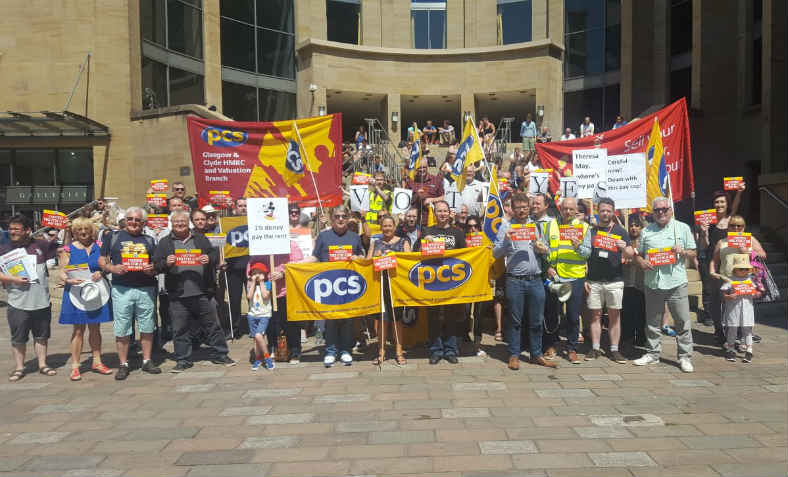 Scotland PCS reps and members rally during the pay strike ballot. Photo: PCS website
Scotland PCS reps and members rally during the pay strike ballot. Photo: PCS website
In spite of the Tories’ anti-strike laws, there are grounds for optimism for PCS in the coming year, argues Floyd Codlin
From June to July 2018 PCS (Public and Commercial Services Union) held a pay ballot in order to gauge the mood of members for further action. This was based upon a previous online ballot in the winter of 2017 that had seen a turn out of over 49%. Although the majority of that percentage was in favour, we were just under the government threshold the last time.
There were high hopes that we could do better this time around, but the turn out result was just 41%, with over 85% of members in favour of industrial action. Though it was disappointing for the turn out to be down from last year, at the same time there is still cause for optimism, which I will lay out below.
- PCS has recruited over 2,000 members as a result of workplace meetings and interventions by reps. There were lots of workplace meetings held both inside and outside where members got to hear the issues involved and ask questions. At least two regional reps’ meetings were held in London and via video conference in order to better co-ordinate political support from outside of PCS
- There were several leafleting sessions on the morning of the ballot as members arrived for work; also, as a result of it being the anniversary of women getting the vote, some female reps dressed up as suffragettes. There were several meetings of reps in the civil service in London, Manchester and in other cities to get constant feedback. There were also exchanges via the Whatsapp group set up, again as part of the co-ordinating attempt
- Although the turn out rate was 41%, it was still far better than a number of previous turnout rates in the not so distant past. There was a more visible presence from the leadership, as well as Facebook Live sessions where Mark Serwotka and Janice Goodrich, General Secretary and President respectively, spoke and answered questions
- They put forward their vision of what they hoped would happen during the ballot process. There were regular phone banks of members, urging them to fill out their ballot papers and send them back
Since the ballot closed and the results came in, there has been a lively debate on social media over two issues. One has been over how the ballot was conducted on the official and unofficial PCS Facebook groups. There have also been contributions on what now from PCS Independent Left and Left Unity.
The other has been over what is our next course of action, and on the latter, it can be summed up as this from the NEC and I feel it important to reproduce the most salient parts of it below:
The next steps for 2018 pay settlements
The NEC agreed to write to the Cabinet Office demanding urgent pay talks. The ballot result shows that 85.6% of our members voted for strike action over pay, showing the strength of feeling on this issue. Therefore, it is important that we convey this message to the Cabinet Office.
The NEC also agreed to support and coordinate delegated groups and branches in pay negotiations. It agreed to call an urgent meeting of senior lay reps to discuss bargaining at delegated level, consider guidance for negotiators, and the potential for further ballots for industrial action. It agreed to fully support groups of members who wish to ballot for industrial action at delegated level.
The 2019 pay campaign starts here
The budget in November will set government spending for 2019. The NEC has already agreed to support a joint union judicial review into the process for publishing the Treasury pay remit.
The budget will take place in November 2018, where the government will set out its spending plans for 2019. If the pay cap is not lifted and the current government spending plans remain in place, then the 2019 pay remit will be similar to the 2018 pay remit. It will also almost certainly follow that we will need to ballot for strike action again over pay. So the NEC agreed that the 2019 pay campaign would start now.
A campaign plan will be put to the September NEC, which will be designed to ensure that if we need to ballot next year we will beat the 50% ballot threshold. The plan will include meetings of reps in our regions and nations in the autumn, building our organisation in key branches, recruiting new members and activists, and collecting and cleansing our data. The campaign plan will include consideration of a major conference or event on the pay campaign at the end of 2018 or beginning of 2019.
Floyd Codlin is writing in a personal capacity.

